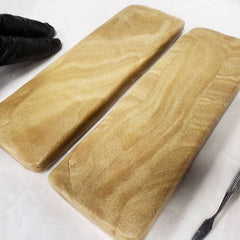The Benefits of Using Stainless Steel Screens for Pressing Rosin


Michael Marerro
Advocate of ethical and sustainable cultivation and solventless production methods with a focus on producing clean, pure products of the highest quality, free of contaminants and synthetic chemicals.
High-quality nylon has been the material of choice for rosin press bags since the beginning of squishing solventless concentrates (remember the days of pressing cannabis flowers with a hair straightener?). Nylon that’s food-grade, boil-resistant, and tough enough to withstand the extreme pressure of solventless extraction has always been welcome in reputable labs, and for good reason. Rosin filter bags like those from The Press Club have helped some of the best extractors in the world produce the finest rosin around.
But there’s another type of filter that’s getting more popular these days: stainless steel.
Michael Marrero, Director of Solventless Production at äkta, put together this guest post for us, outlining some of his reasons why he has been using stainless steel press screens for years. Yes, while we were admittedly suspicious about switching over to stainless steel for pressing rosin at first, we conducted our own lab tests this past year to substantiate the advantages of using stainless steel were true.
We’re grateful for Michael's openness to sharing his knowledge and experience, and we hope you learn as much from him as we have. Here’s what Michael has to say…
I've been using stainless steel, 25u mesh screens to press for almost 7 years now. I've done my fair share of pressing using nylon as well and have come to the conclusion that stainless steel is the way to go for various reasons:
1. MAINTAINS SHAPE / PHYSICAL INTEGRITY
Stainless steel mesh has the advantage of maintaining its shape and physical integrity under conditions of high heat and pressure over nylon mesh. This means at high pressure and with heat applied, the micron pore size remains truer and is less likely to stretch, warp, and break, resulting in better filtration and less contaminant in the final product. It is also food grade material used in many industries that handle sensitive substances and work in sterile/ultra-clean conditions (medical, lab, chemical, etc.).
Check out this magnified image of stainless steel mesh below.
2. 65% IMPROVED TRACTION
Another consideration to account for is when pressing greasy strains, nylon bags have a propensity to slide under conditions of extreme heat and pressure which can cause the bag to shoot out or come out of alignment. Our lab tests show that stainless steel improves your traction by at least 65% during the press. We recommend wrapping your hash with exclusively with stainless steel and skip the double bag or use it as the double bag around a regular nylon rosin bag.

3. NO NYLON IN YOUR ROSIN
When using nylon, it's important to ensure the bags are constructed properly without loose strings or frays, which may end up in your rosin during a press. The Press Club's production process ensures that this doesn't ever happen, but that's not always the case with other manufacturers. When using cheap rosin bags like Dabpress, there's a higher likelihood of nylon getting pressed into your rosin. Check everything under a microscope is our recommendation! This is something to watch out for when you're pressing with nylon bags, but not a concern when pressing with stainless steel mesh.
4. MORE HASH PER PRESS SQ INCH
When using stainless steel mesh screens, it requires pre-forming your hash into a brick/puck (whatever you want to call it) and then wrapping this brick in the stainless-steel screen. Having to compress the hash into a brick-like shape, it allows for more hash to be pressed at once vs filling a nylon bag with loose, sandy hash and crossing your fingers you won't get a blowout. With stainless steel, you can press as little as 30g, or as much as 250g in one go on a press like the Long's Peak and can even press more depending on the size of your press plate and dimensions of your SS mesh screen.
5. MORE LAYERS OF FILTRATION
When using stainless steel mesh, you lay your hash brick on one end of the screen and proceed to wrap the screen onto the hash brick and then onto itself several times. When you are done wrapping, you end up with 2-4 layers (usually 3-4 layers with my technique) of stainless-steel mesh covering every side of your hash brick depending on the size of your brick and SS screen mesh. That is 2-4 layers of 25u mesh (minimum recommended micron size for pressing live rosin) that the hash oil is filtered through during pressing. It is most common to double-bag when using nylon bags for pressing which means that usually rosin is only going through 2 layers of 25u filtration when pressing with nylon. More layers of filtration = cleaner rosin.

6. NEVER BLOWOUTS
Another advantage to using stainless mesh is the increased blowout resistance. Stainless steel has a higher tolerance to the physical forces applied during rosin pressing than nylon does, therefore you are less likely to have a blow-out than when using nylon mesh. This is handy for people who are new to pressing or haven't dialed in ramping up pressure during presses, as SS mesh can be a little more forgiving if too much pressure is applied too quickly.
7. REUSABLE
Stainless steel screens can be re-used in a pinch. Due to its high tolerance to heat & pressure, multiple uses can be had out of one screen. Obviously, this would require a very thorough cleaning of the used screen and proper handling when using it a second time, but this can be very helpful when in a pinch (ran out of screens, etc.).
8. DOWNSIDES? COST & AVAILABILITY
There is one downside of pressing with SS mesh screens, and that is cost and availability. Nylon mesh is a lot cheaper to produce than stainless steel mesh and therefore one SS screen usually costs more than one nylon bag. Nylon press bags are also easier to source than SS screen mesh screens. However, given that you can press more hash in one go with SS screens, and that one SS screens = 2-3 nylon bags per press, that cost difference can be mitigated quite a bit if focus is put on making each press using SS screens as efficient as possible (maximizing the amount of hash pressed at once). Pressing more hash at once also saves you a lot of time (and labor), further mitigating the cost difference, which is very useful for hashmakers/operations that press high quantities of rosin at a time.
HOW TO: WRAP YOUR HASH W/ STAINLESS STEEL SCREENS VIDEO
Conclusion
Thanks again to Michael, Director of Solventless Production at äkta, for putting this together. Look at the caliber of solventless products coming out of the lab at äkta, and you can see a clear demonstration of the benefits of pressing with stainless steel.
The debate between nylon and stainless steel as the preferred material for rosin press screens continues to evolve. While nylon has long been favored for its affordability and initial effectiveness in filtration, the rise in popularity of stainless steel screens, as advocated by experts like Michael Marrero, presents a strong case for reevaluation. Michael's insights highlight the durability, integrity, and safety advantages of stainless steel over nylon, particularly concerning heat resistance, particle shedding, and potential health risks associated with microplastics and volatile organic compounds. Furthermore, the efficiency gains and cost-effectiveness of stainless steel screens, despite their initial investment, underscore their viability as a superior long-term solution for high-volume rosin production.
As the industry continues to innovate and refine extraction techniques, the shift towards stainless steel screens signals a progressive step towards improving product quality, purity, and safety standards. While acknowledging the challenges of accessibility and upfront costs, Michael’s endorsement of stainless steel screens emphasizes the importance of prioritizing efficacy, sustainability, and health considerations in solventless extraction practices. As consumers and producers alike seek higher standards and greater transparency in cannabis products, the ongoing dialogue surrounding rosin press materials underscores the dynamic nature of the industry and the commitment to advancing best practices for the benefit of all stakeholders involved.
Have you pressed rosin with stainless steel screens? Let us know in the comments!
Thoughts? Let us know by joining our secret Facebook group. Hang out with a community of like-minded solventless heads like yourself. Ask our head extractor questions, share your latest press and learn from hobbyists and experts in the industry.



Leave a comment
Please note, comments must be approved before they are published